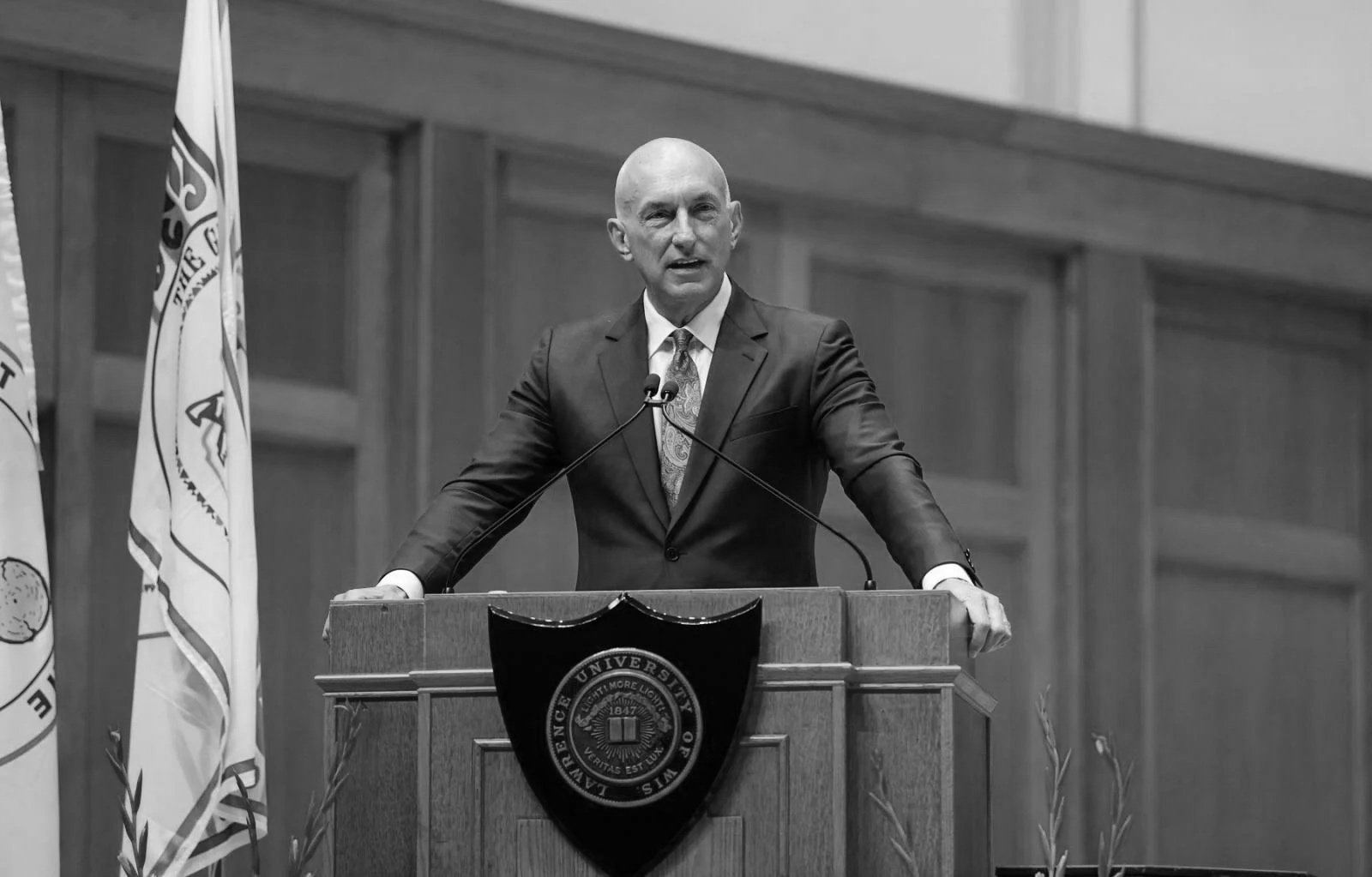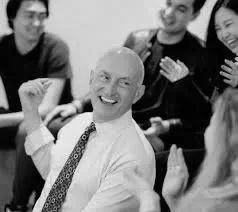Leadership in Harmony: Dr. James Gandre, A President Who Leads Not from Behind a Desk, but Among His Community.
James Gandre - President of Manhattan School of Music
Leadership is not the echo of one voice, but the resonance of many, united in purpose.
Leadership in Harmony: Dr. James Gandre, A President Who Leads Not from Behind a Desk, but Among His Community.
I have often wondered what makes a leader truly great. Titles and authority can demand respect, but they cannot inspire it. Authentic leadership is a kind of music, heard not in declarations, but in harmony. It is the quiet alignment of purpose, people, and vision. When I think of this kind of leadership, I think of Dr. James Gandre, President of Manhattan School of Music. From my first encounters with him, it became clear that he leads not through distance, but through presence. I remember watching him during orientation week, standing outside on Claremont Avenue, greeting students by name as though each arrival were a reunion. He did not carry the posture of authority; he had the warmth of welcome. In those gestures, I began to understand what kind of leader he is, one who conducts not from the podium, but from within the orchestra itself.
From Stage to Stewardship
Dr. Gandre’s path to leadership began, fittingly, on the stage. As a tenor, he performed with some of the world’s foremost ensembles, the Cleveland Orchestra, Philharmonia Baroque, and the London Classical Players. He appeared in more than 175 professional choral performances with institutions such as the New York Philharmonic, the Royal Concertgebouw, and the Metropolitan Opera Orchestra. Performing under legendary conductors such as Leonard Bernstein and Zubin Mehta, he absorbed lessons that no classroom could teach, humility in the presence of greatness, clarity under pressure, and a deep respect for collaboration. Music, after all, is a conversation, a truth that would later define his approach to leadership.
Dr. Gandre at Lawrence University
By his mid-twenties, he recognized that his calling extended beyond performance. While many of his contemporaries pursued solo careers, he turned his attention to shaping the institutions that nurture talent. Armed with both a Bachelor's and a Master's of Music in voice performance, and later a Doctor of Education in Higher Education Administration, he began reimagining what an artistic community could be. It was not enough to train musicians technically; he wanted to build environments where artistry could coexist with empathy, ambition with inclusivity. When Dr. Gandre first joined the Manhattan School of Music in 1985, he served in multiple roles before being appointed Dean of Enrollment and Alumni.
He eventually left to join Roosevelt University’s Chicago College of Performing Arts, where he served as Dean from 2000 to 2007, Interim Dean of the College of Education from 2006 to 2007, and Provost and Executive Vice President from 2007 to 2013. During this time, he refined the skill set that would later define his presidency, an ability to balance vision with pragmatism and ideals with strategy.
When he returned to Manhattan School of Music in 2013 as President, it was, in many ways, a homecoming. At that time, MSM stood on the threshold of change, its next chapter waiting for a leader capable of expanding its vision while preserving its soul. Building a Conservatory for the Future. Over the following decade, his presidency became synonymous with transformation. Nearly $40 million was invested in campus improvements, a figure that, while impressive, tells only part of the story. The newly restored Neidorff-Karpati Hall, a $16.5 million renovation, became a symbol of his belief that artistry deserves environments worthy of its spirit. With redesigned acoustics, elegant lounges, and public spaces for community gathering, the hall now embodies the intersection of function and beauty. Under his guidance, the number of practice rooms increased by 30 percent, two new dance studios were built, and the Student Union created a physical hub for connection. These changes, though structural, reflect something more profound: Dr. Gandre’s conviction that creativity thrives best when artists feel seen, supported, and inspired. The physical renewal of MSM mirrors the cultural one he continues to cultivate, a culture defined by openness, curiosity, and belonging.








Beyond architecture
His academic reforms have been equally forward-thinking. Under his leadership, MSM launched the nation’s only undergraduate musical theatre degree offered by an independent conservatory, the Professional Performance Diploma for post-graduate artists, and the Global Conservatoire, a groundbreaking virtual partnership connecting MSM with the Royal College of Music in London, the Royal Danish Academy of Music, and the University of Music and Performing Arts in Vienna, later adding the Amsterdam Conservatory. These initiatives redefine what a conservatory can be in the 21st century, not a gatekeeper of tradition, but a living bridge between past and future.
During the COVID-19 pandemic, Dr. Gandre’s steady leadership helped MSM navigate an uncertain time with compassion and focus. His approach ensured that students and faculty remained supported, connected, and able to continue their work safely and meaningfully. Through thoughtful planning and empathy-driven decisions, MSM remained a place of stability and purpose in uncertain times. Even now, hearing faculty and students speak of that period, one senses the profound respect they carry for his steady hand and human warmth. His response to that global challenge is remembered not only for its effectiveness but for the empathy that guided it, a defining characteristic of his presidency. What struck me most, even in the short time since meeting him, is the calm clarity with which he speaks about leadership and responsibility. There is no self-congratulation, no sense of distance, only focus and purpose. In conversation, he often returns to the idea that music, by its nature, adapts. It is a phrase that captures both his temperament and his philosophy, that resilience and creativity are inseparable. Even without witnessing those earlier moments of challenge, it’s clear that his leadership has always been rooted in composure, vision, and an unshakable belief in the transformative power of the arts.
The Human Measure of Leadership.
A President Who Leads Not from Behind a Desk, but Among His Community.
Equity, and Inclusion forms another cornerstone of his presidency. Through initiatives like the Cultural Inclusion Initiative and the Black Creators Initiative, MSM has ensured that the music performed reflects the world we live in, not only the traditions we inherited. He understands that diversity is not a gesture of modernity; it is the essence of artistic truth. In broadening the canon, he has expanded the imagination of what classical music can mean to future generations.
Yet, for all these large-scale achievements, what stands out most to me are the quiet, human moments that reveal who he is beyond the title. The first time I met Dr. Gandre was in the cafeteria at MSM. He was standing in line like everyone else, ordering his own food, and greeted me with kindness and warmth. There was nothing performative about it, just genuine presence. In that brief exchange, I sensed the essence of his leadership: approachable, unpretentious, and deeply human. He is the kind of leader who moves through his community not as a distant figurehead, but as a participant in its daily rhythm.
Neidorff-Karpati Hall
Accessibility is not a façade; it is his philosophy. His office door is literally open most days, a symbol of transparency that has become part of MSM’s culture. His leadership dismantles hierarchy without diminishing respect. He does not lead from above, but among, proof that humility and authority can share the same space. Beyond the walls of MSM, his influence extends across the national arts landscape. He serves on the Advisory Council of the Misty Copeland Foundation, as a Trustee of his undergraduate alma mater, Lawrence University, on the Recommendation Board of the Avery Fisher Artist Program, and was a voting member of the National Academy of Recording Arts and Sciences, the organization behind the GRAMMYs. His scholarship, too, has left its mark; his doctoral research on the history and evolution of independent conservatories continues to inform academic discussions on arts education, and he has contributed chapters to two books on leadership published by Johns Hopkins University Press. But it is his human presence that endures most powerfully. Whether in the midst of a board meeting or a casual hallway chat, Dr. Gandre exudes a calm that seems almost musical, a tempo that balances intensity with grace. He does not seek to control the rhythm; he listens for the ensemble’s pulse.
Dr. Gandre — leadership and artistry playing in the same key.
As I reflect on his legacy, I realize that his leadership cannot be measured solely in numbers, programs, or accolades. Its true scale is found in the lives of those he has influenced, the students who found confidence in his encouragement, the faculty who found freedom under his guidance, and the institution that rediscovered its sense of purpose through his vision. Leadership, as he demonstrates, is not an act of command; it is an act of composition. Like a symphony, it weaves individual voices into something greater than any one player could produce alone.
When leadership listens, the whole institution sings.
When I think of Dr. James Gandre, I think of a conductor who never stops listening, a president who knows that excellence without empathy is noise, and empathy without excellence is silence. He leads, instead, in harmony, a balance of intellect and heart that reminds us all what it truly means to create, to connect, and to lead.




